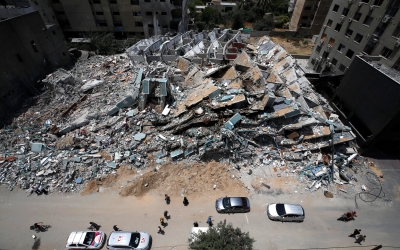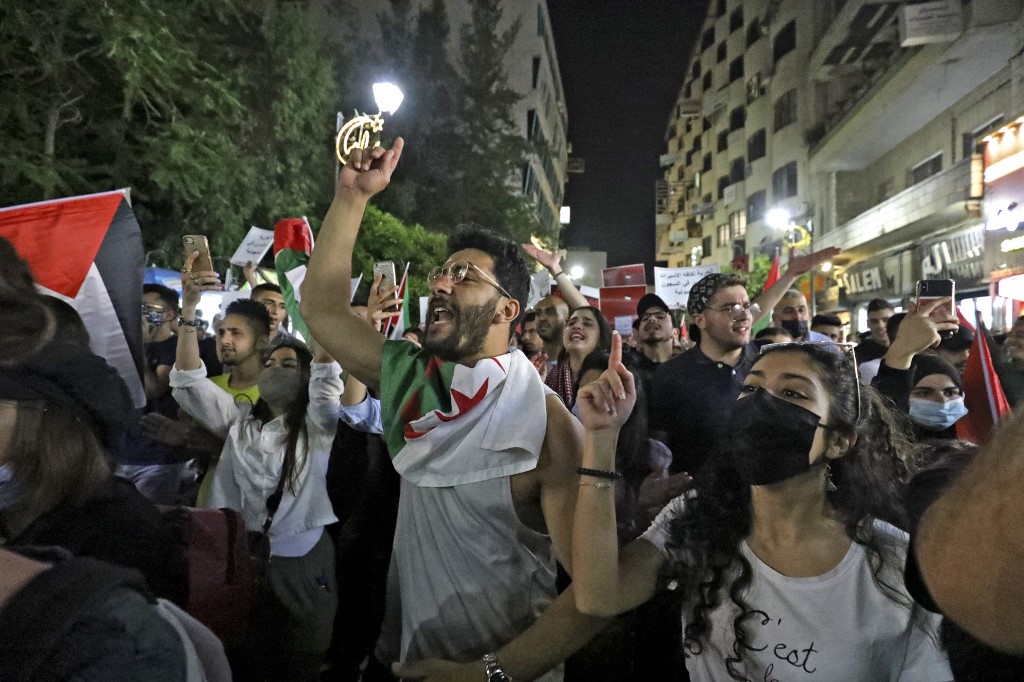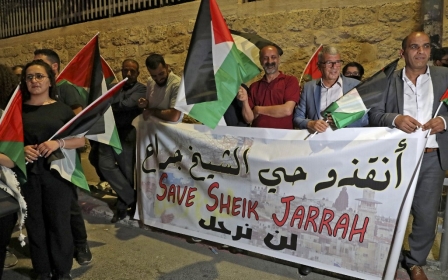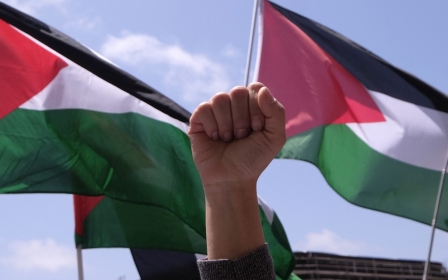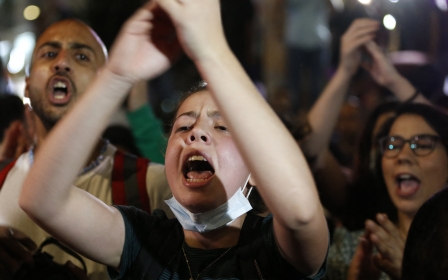Nakba: Seven decades on, Israel has united not defeated Palestinians
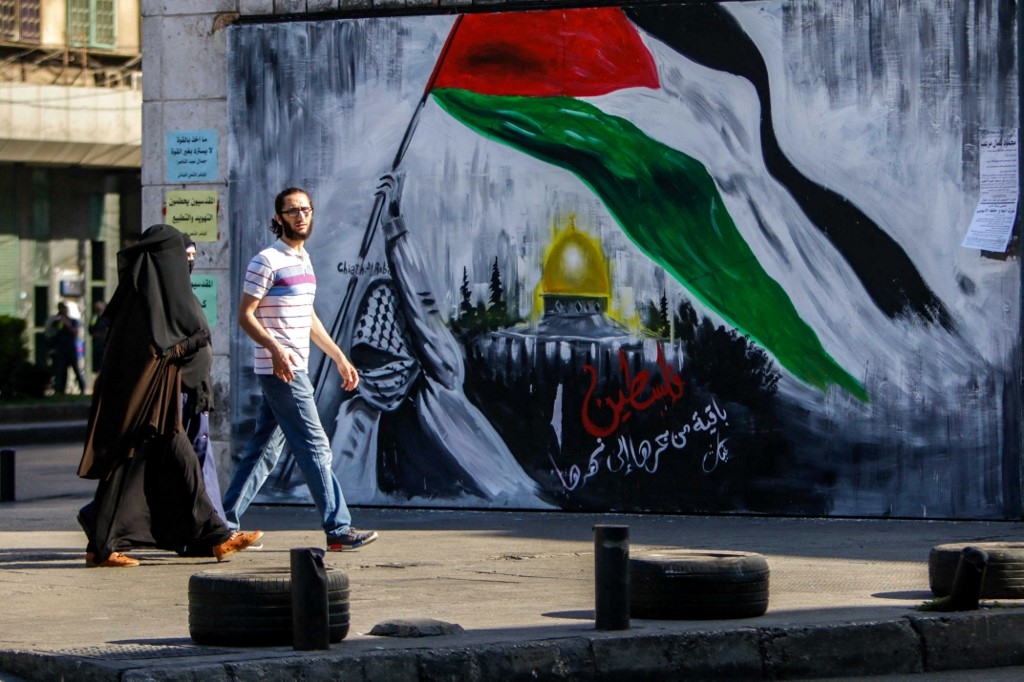
Nakba commemorations on 15 May will be like no other year that I can remember. The whole of historic Palestine is rising up against injustice, apartheid, settler-colonialism and occupation.
There is no need to hold back on describing what Israel has done to the Palestinian people in the name of a racist ideology. Zionism demands that Jews have a right to self-determination, which it has looked to achieve in another people's homeland: Palestine.
The 1917 Balfour Declaration was a shameful undertaking by which Britain promised to give the Palestinian homeland - which it did not control - to another people, without consulting Palestinians.
The Sheikh Jarrah campaign brought Palestinian injustice back into the public spotlight. This, I believe, is what angered Israeli leaders and zealots the most
And yet, despite the expulsion of Palestinians and the creation of a Jewish homeland, the Nakba is being played out all over again.
What started a few weeks before Nakba Day as a campaign by Palestinian families facing eviction from their homes in occupied East Jerusalem's Sheikh Jarrah neighbourhood, has turned into a Palestinian awakening in all areas of historic Palestine, confirming that we are one people. Those behind the Save Sheikh Jarrah campaign, asking for solidarity from around the world to help pressure Israel to drop its eviction plans, could surely not have imagined how events would play out.
New MEE newsletter: Jerusalem Dispatch
Sign up to get the latest insights and analysis on Israel-Palestine, alongside Turkey Unpacked and other MEE newsletters
Continuing Nakba
The story of Sheikh Jarrah is an example of the continuing Nakba. A group of peaceful families trying to live their lives and remain in their homes have come up against the coloniser's wrath - not through massacres like the one at Deir Yassin in 1948, but through the legal system of an occupying power.
The colonisers paint this as a property dispute, rather than the continuation of a demographic push to turn the holy city of Jerusalem - home to Muslims, Christians and Jews - into a Jewish city.
There is no doubt that the Sheikh Jarrah campaign brought Palestinian injustice back into the public spotlight. This, I believe, is what angered Israeli leaders and zealots the most. They figured the courts would find in favour of the settlers, and they could once again tout the "independent" legal system. Instead, as international pressure mounted, Israel's Supreme Court postponed the matter.
At the same time, the brutality of the occupier's security instruments has been broadcast for all the world to see (minus the rotten smell of skunk water, with which Palestinian residents have had to live for days).
As the global campaign gained momentum in the West, Jewish Israeli extremists chose to march in Jerusalem during Ramadan, chanting "death to Arabs", without the Netanyahu government reining them in.
Important victory
Confrontations between occupier and occupied escalated as the Damascus Gate steps became a flashpoint. Israel had installed steel barriers at the site, disrupting the normal flow of Ramadan socialisation, but a sustained revolt ultimately led to their removal - a small but important victory.
Following this victory, the reality of the divided city was clear for all to see, despite Israel’s claims that Jerusalem was its “undivided capital”. Scores of security forces were needed to maintain the occupation of the city’s eastern portion; in what Palestinians saw as a display of bravery, youngsters mocked them, knowing that the consequences could be dire.
Constant news coverage captured a number of arrests, and a common theme emerged, with young Palestinians smiling as they were led away, many to soon be released. I wondered whether we were witnessing the “smiling intifada”. How brave these young Palestinians looked, and how dejected and beaten the occupying forces appeared.
It was also clear who the rightful owners of the city were, and who were the occupiers - a full 73 years after the Nakba. Yet, before I could try to normalise the notion of the “smiling intifada”, things escalated. There were no more smiles to be found.
As thousands of far-right Israelis prepared to celebrate the theft of Jerusalem on 10 May by marching provocatively through the Old City, Israel decided to flex its muscles and attack worshippers at al-Aqsa Mosque. The grotesque and unprovoked attack on the holy site, and the ones that followed, marked a turning point - the start of an uprising across historic Palestine.
Hamas and other groups in Gaza responded with hundreds of rockets. Israeli barbarism was there for all to see in its response, which included the slaughter of dozens of Palestinians, including many children.
Changing the game
It was the support through protests in Arab and mixed Israeli cities, however, that changed the game completely. To see Palestinians supporting each other across the whole of historic Palestine brought out the most vicious, racist response from far-right Jewish mobs. In Haifa, Lod and Jaffa, to cite but a few, the spirit of settler-colonialism came to the fore.
Settlers believe that all of historic Palestine is theirs. Through terror, war and political manoeuvring, they thought they were winning, driving Palestinians out. Yet, half the population in historic Palestine is Palestinian - and they are again feeling united as one people under settler-colonialism. They all want to be free of it. The power imbalance heavily favours Israel, but the demography does not.
What are Palestinians supposed to do in pursuit of justice and freedom? This starts with unity
If freedom, justice and equality for Palestinians seem unachievable through non-violent means, then what next? They can’t rely on their Arab brethren for support. Refugees can’t return. They can’t demonstrate peacefully and achieve their rights. They can’t seek redress through international law, possibly because Palestine is not considered a state.
But if they fire a rocket, they are “terrorists” and Israel is “entitled to self-defence”, as the new US administration has stated.
So, what are Palestinians supposed to do in pursuit of justice and freedom? This starts with unity - and I am not talking about Fatah and Hamas, but Palestinians in Haifa, Jerusalem, Ramallah, Gaza, Beirut, Damascus, Chile and Australia. We are one people with a right to self-determination in our homeland.
Standing with the oppressed
The world should stop “expressing concern” by condemning settlements, evictions and home demolitions, and instead begin to act. No country should have normal relations with a rogue entity that considers itself above the law. The time for diplomacy has come to an end. If so-called democratic countries will not force Israel to heal, then they should not tell Palestinians how to end their plight.
The victims here are the Palestinian people, and not the settler-colonial apartheid state that occupies them. It is time to stand with the oppressed against the oppressors. The oppression that Palestinians feel is a direct result of Zionism and the complicity of those who claim to hold universal values, but then give Israel a free pass for denying these values to Palestinians.
Indeed, recent events have shown that rather than defeating the Palestinian people, 73 years on, Israel has united them.
The views expressed in this article belong to the author and do not necessarily reflect the editorial policy of Middle East Eye.
Middle East Eye delivers independent and unrivalled coverage and analysis of the Middle East, North Africa and beyond. To learn more about republishing this content and the associated fees, please fill out this form. More about MEE can be found here.



